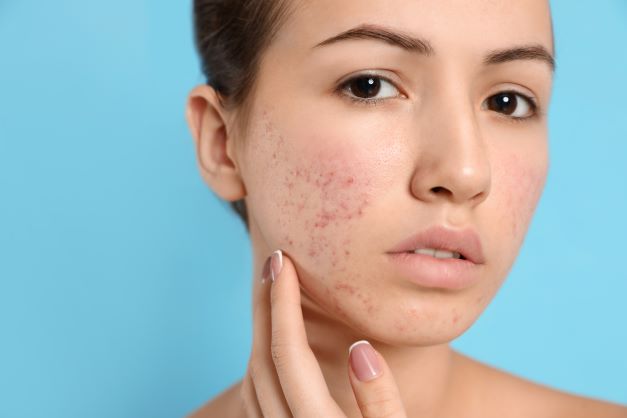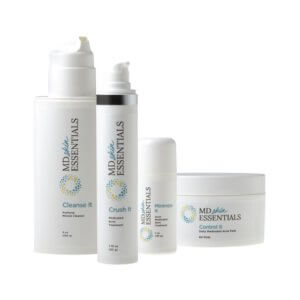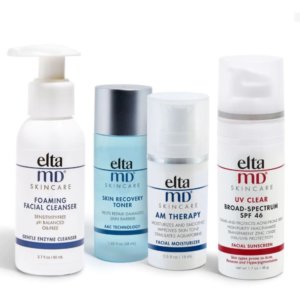Acne is one of the most common skin conditions. It impacts millions of people each year. The American Academy of Dermatology reports that about 85% of people between the ages of 12 and 24 experience some degree of acne on the face or body. This condition is so common that there are numerous over-the-counter treatment options available. However, not all acne can be managed with over-the-counter treatments. In these cases, it’s important to work with a dermatologist to develop a skincare routine that reduces the number and severity of acne breakouts. Dr. Maeve Maher of U.S. Dermatology Partners in Leawood, Kansas, and Lee’s Summit, Missouri, says, “You can work with a dermatologist to develop a skincare routine for any skin type, including acne-prone skin. However, acne is so common that many people choose to manage the symptoms on their own when possible. There are some situations where acne may not be well managed with at-home treatment options, so it’s important to know when you should seek professional help with acne treatments.” In this blog, Dr. Maher will review the top five reasons that patients should see a dermatologist for acne.
1 – You’ve Tried Over-the-Counter Acne Treatments & They’re Not Working
You can purchase acne cleansers, spot treatments, and other products over-the-counter, and in many cases, these products will address the effects of an acne breakout in about four to six weeks of consistent use. Incorporating treatments with benzoyl peroxide, salicylic acid, and other common acne-clearing ingredients into daily skincare routines can also help to prevent breakouts in the future. Unfortunately, some patients are not able to clear up their acne breakouts with over-the-counter products. According to Dr. Maher, “Patients who try over-the-counter skin care products for acne and don’t see an improvement should make an appointment with their dermatologist right away. The longer an acne breakout lasts, the higher the risk for complications like scarring, dyspigmentation, and infection. Not to mention that long-lasting acne breakouts can be painful, and there’s no need to live with discomfort when a dermatologist can help you feel better more quickly.”
2 – Over-the-Counter Acne Treatments that Worked in the Past Have Stopped Working
According to Dr. Maher, “People will often find an acne treatment plan that works for them. They use it for years with great results. Then, it stops working or doesn’t work as well over time. They begin to notice more frequent or severe breakouts, and the blemishes aren’t as responsive to spot treatments. In these situations, a dermatologist can help patients adjust their skincare routines and acne treatment plans to address their changing needs.”
3 – Acne Blemishes Are Painful, Poorly Healed, or Leave Scars
Acne blemishes that are very painful, heal poorly, or leave scars may be a sign of more severe forms of acne that require professional treatment. Dr. Maher says, “Very severe acne, including cystic acne, will almost always require treatment from a dermatologist. The severe forms of acne are often painful, and they are more likely to lead to complications like scarring, dyspigmentation, and infection. A dermatologist can help to clear up severe acne breakouts more quickly and with less discomfort as well as partner with patients to create a customized treatment plan to prevent future breakouts.”
In the case of severe acne, over-the-counter treatments are unlikely to be effective. To reduce the risk of scarring and jumpstart the body’s healing process during a severe acne breakout, your dermatologist can provide a range of in-office treatments like corticosteroid injections or perform an extraction to safely eliminate large acne cysts, nodules, papules, and pustules. They may also prescribe oral medications like (commonly referred to as Accutane) or topical medications to address severe acne at home. If severe acne has caused scarring or uneven skin tone and texture, your dermatologist can also offer in-office and at-home treatments to improve skin’s appearance.
4 – Acne Is Negatively Impacting Your Self-Esteem
Research shows that chronic acne can negatively impact the mental and emotional health of people who struggle with this condition. People with acne are more likely to struggle with anxiety, depression, and low self-esteem. Many people will choose to miss out on events and opportunities to spend time with their loved ones because they don’t want people to see them during a breakout, which can lead to feelings of isolation and loneliness. Addressing acne breakouts can improve mental health outcomes and restore lost confidence.
5 – Acne Develops After Starting a New Medication
Finally, you may want to work with a dermatologist for acne treatment if you develop this skin condition for the first time after taking a new medication. Medications for a variety of conditions can cause acne breakouts. Your dermatologist can work with you and your prescribing physician to determine the next steps.
Considerations Before Scheduling Your Visit
According to Dr. Maher, “Your dermatologist will always be happy to help you improve your daily skin care routine or provide treatments to address acne breakouts, but if you just started a new treatment, remember to give it plenty of time to work. Acne treatments can take a month or longer to deliver the desired results. Your dermatologist will likely want you to keep consistently applying a treatment for 6 to 8 weeks before recommending something different.”
To prevent acne breakouts and address symptoms during an acne breakout, take the following daily skincare steps:
- Wash your face in the morning and before bedtime as well as any time your skin is sweaty.
- Don’t pick at or pop blemishes.
- Wash your pillowcases and sheets at least once a week.
- Apply acne treatments to blemishes and all areas of the skin where breakouts often occur.
- Choose skincare products and cosmetics that are non-comedogenic (that means they’re formulated specifically with acne-prone skin in mind).
- Don’t scrub or over-exfoliate areas of the skin that frequently break out. It can be tempting to scrub the oily, greasy skin in areas where breakouts occur, but this will be more likely to irritate the skin, prolong the breakout, and cause unnecessary inflammation.
Ready to Schedule a Visit with a Dermatologist at U.S. Dermatology Partners?
If you’re interested in learning how you can improve your skincare routine to control acne breakouts, don’t hesitate to reach out to one of the knowledgeable professionals at U.S. Dermatology Partners. You can get started any time by completing our simple online scheduling form. Once we receive your request, a team member will be in touch to finalize the details of your appointment in one of our local U.S. Dermatology Partners practices.
Find a location near me
or




